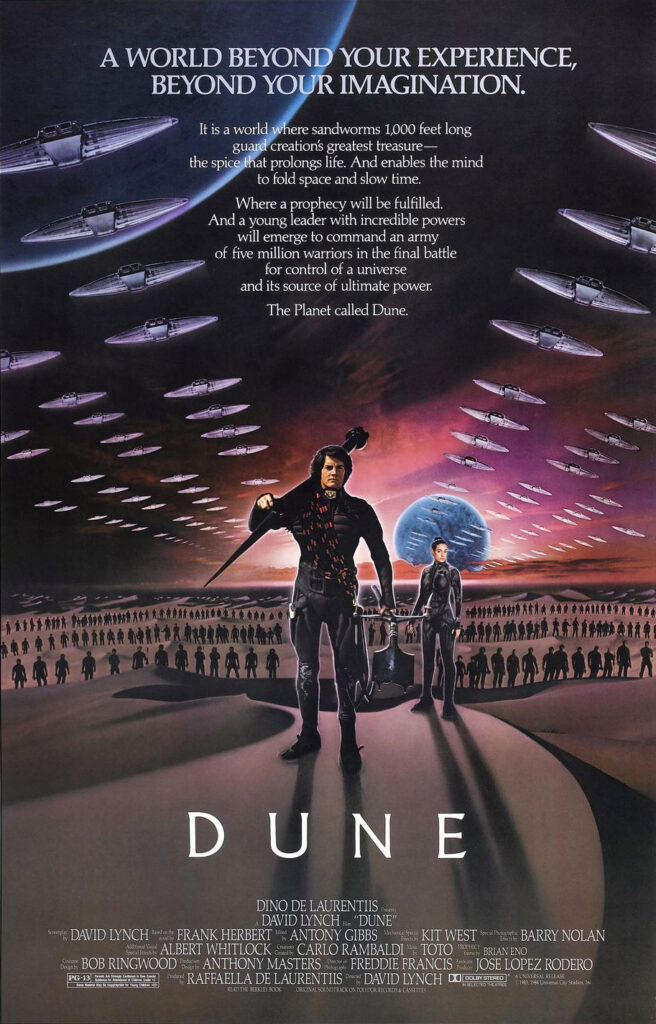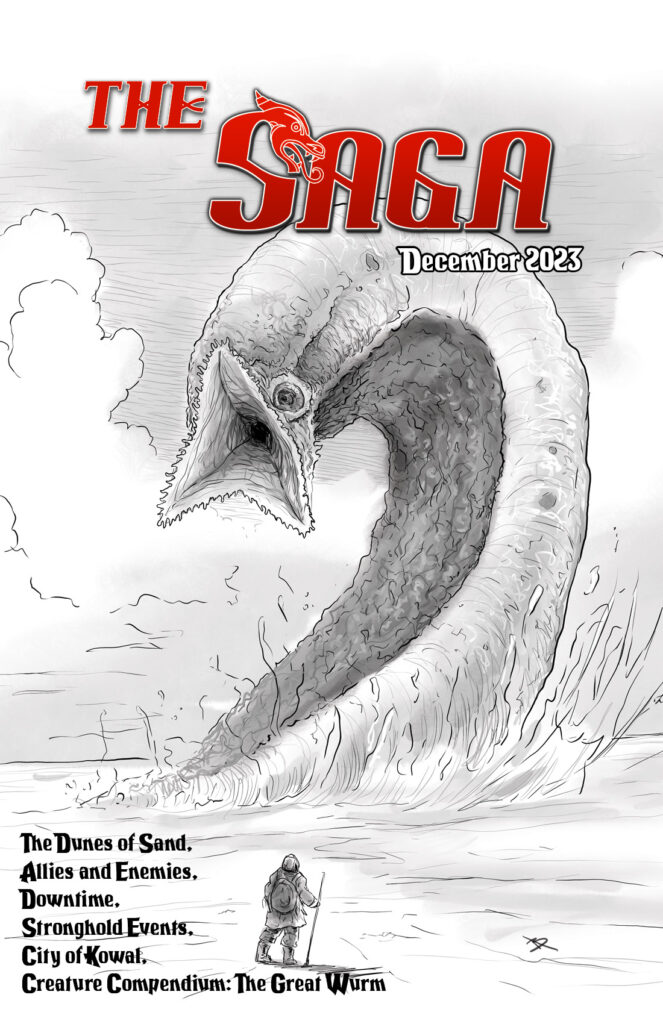It’s time for that discussion of imagination again, the Appendix i of our creativity, where Dane and Mike discuss the things that made them the creatives they are.
Dune has influenced so many of our sci-fi and fantasy worlds since its publication. I know my world has definitely seen some influences from it, especially in the depth of history and people that Herbert’s world is known for. Let’s take a trek across the sands and see how deep the Sandworms have burrowed.
Mike:
There is so much to cover with Dune, I hope we don’t end up with a novella worth of discussion here! So let’s start with the basics: why did Dune resonate with you?
Dane:
I’ve always had a love/hate relationship with technology. I love the function it offers. It helps solve problems. It’s responsible for all of our livelihoods. But I noticed from a young age that the more technology advanced, the more I sensed a mass delusion developing in society. The real world is out in nature, and it’s with one another. But we’re becoming more and more immersed in this manufactured reality while shutting out nature and one another.
So the idea that people might eventually rebel against it and instead improve themselves was fascinating to me. Of course, that brings its own set of problems: human breeding programs/eugenics, castes, etc. I didn’t find the feudal society of Dune appealing, but I found it fascinating to explore.
In particular, I was interested in the Bene Gesserit. When I was a kid, I got into martial arts, but not because I wanted to fight. It was because I was obsessed with the idea of chi. I was attracted by the idea that I could condition my mind and body in ways that would allow me to channel my strength by quieting my mind. I got into tai chi, chi gung, and meditation. So when I read Dune as an adult, the Bene Gesserit seemed to be what would happen if you followed that path, generation through generation, perfecting the art over centuries. Their art seemed magical, but it resulted from practice and conditioning rather than requiring belief in something supernatural and ineffable.
And then there was the spice. A psychedelic substance that offers higher awareness and sometimes prescience. The fact that it turned the eyes blue was secondary, but added an interesting aesthetic that made the Universe feel more alien and futuristic.
I prefer sci-fi when it’s less about advanced technology and more about exploring philosophies to their futuristic conclusions and exploring how human beings interact and relate with one another in these settings. That’s what Dune was.

How about you?
Mike:
So my introduction to Dune was through the David Lynch film. At the time, I was young and wanted more Star Wars. It was not that. But the film and the themes haunted me. And while that film wasn’t the book, it did have a…feel for the universe that was captivating. So many things that left me uncomfortable as a kid are the things I constantly came back to. Like Bladerunner leading me to Do Androids Dream of Electric Sheep, or the Martian Chronicles leading back to constant rereads of the book. There are things that hit deeper than entertainment, and while I may have been dissatisfied at first exposure, they kept wiggling their way deeper and lasting in my mind much longer.
Dune had something to say about many things, but it wasn’t mindless propaganda; it was a story first, built on the philosophy of Herbert. It’s something I think is missing these days in a lot of our mass-consumed media. An example, which also has to do with deserts and was probably very much influenced by Dune, is Dark Sun. When you listen to Troy Denning talk about the origins of the setting, he tells you how he worries about climate change and excessive lifestyles, which can be seen written directly in his world-building. Dark Sun 4th edition seemed much more…designed by committee. It is hard to say how much, but I feel like so many things these days are sanded smooth for better consumption. Dune wasn’t that way.
So back to the 80’s.The movie haunted me, so I had to get to the book. When I did, it reminded me of Tolkien’s work. It felt complete. It was scary, harsh, and no fairy tale, but it all made sense. I love when complicated fiction tells a good story, and the world feels so deep.
I would say the other thing that Dune did was break down the “everything is going to be good at the end” that I had gotten used to in stories.
Sure, in Lord of the Rings, the Hobbits come back to the scouring of the shire, but it still felt happy in the end. At the end of Dune, Paul became the chosen one, but was it a good thing? It was better than what could have happened. So I would say Dune was the first series that really stuck with me and didn’t have the fairy tale ending. And while that can be unsatisfying to a kid, I think it sets up a mindset for looking at the world in a better way.
Dane:
You know, I didn’t see that movie until after I read the books. I remember a friend having the Betamax version when I was a kid. He brought it over to my house to watch, but I had a VHS machine (this was when the two technologies were still fighting it out). So we weren’t able to watch it, and when he watched it on his own later, he said it was boring. So, I never watched it.
I wasn’t exposed to the story until I was an adult. The book was recommended by a friend, so I checked it out, and three weeks later, I was reading book 6. It really hooked me. Most people like each book a little less than the last in that series, but for me, it was the exact opposite. It kept getting better. Weirder. More alien.
Then I finally watched the David Lynch movie and loved it. I understand why people hate it, and the changes from the book are confusing (I never figured out the point of changing how the spice helps the Guild Navigators, for example), but it was weird and interesting. It could reasonably be called a terrible movie (and most people did), but it felt right to me. It pulled me in.
What do you think of the new movie, by comparison?
Mike:
The new movie was entertaining. I enjoyed it. I thought Villeneuve checked a lot of boxes with his version. I enjoy his style of filmmaking. I did have a hard time getting totally in the mood with the film. There were lots of big “War of the Worlds” noises followed by important dialogue that was whispered. Almost every character was played by a well known actor, and for me, most never turned into the characters for me. It became a little distracting, especially in my latest rewatch. So I really liked it, but I didn’t get lost in it like I did, say, Bladerunner 2049.
A great example of this is Rabban. Every time I saw him, he just seemed like Bautista in make-up. In 2049, Bautista disappeared into the lost replicant farmer. Maybe this is just me.
I will say this is the best I think we can get to having Dune made into a movie. It did feel like the books, just with a mild Hollywood gloss over it.
Dane:
I thought they nailed it. I only had a few minor issues. First, I couldn’t help but compare it against the Lynch movie, and I do miss the weirdness of that one. The new one looked like standard science fiction with maybe a bit more sophistication.
At first, I took some issue with the portrayal of Jessica. She showed emotion throughout the movie. In the books, her emotions put her at odds with the other Bene Gesserit, but that doesn’t mean she was regularly succumbing to those emotions. She was still a trained Bene Gesserit.
But when I watched it again, I noticed little moments where she was able to shift her emotions as needed. Maybe it’s too subtle since it took me two viewings to notice, but it’s there.
I realized that, as a writer/director, if you’re not going to use thought bubbles like the original movie, and you’re trying to avoid long exposition, then you have to get these ideas across in the action. So if I were directing the movie, I might do the same thing. Jessica lets herself feel more emotion—particularly love—than the others of her order. You show that by having her show some emotions, even if it didn’t quite look like that in the book. Then you demonstrate that she’s still in control of them. So something I didn’t care much for the first time I watched became something clever that I appreciated the second time.
A lot of my final opinion depends on Part 2.
I think it’s perfect timing to have these movies come out now, right before the real-world Butlerian Jihad begins.
Mike:
I guess that is always a sign of good fiction when almost 60 years later, it still echoes what’s happening in our culture.
So we have discussed what we like about the books and movies, but how has Dune shaped your creativity, and why do you think it is so important for people to keep reading this series?
Dane:
I can remember a few very specific moments in my development as a writer. I read my first adult novel (Psycho) when I was 9 and was amazed that someone could create something that affected me the way it did with just words. Then a friend turned me onto fantasy books, and I discovered Raymond Feist’s Riftwar Saga, and I thought how amazing it would be if I could create an entire world and write about it. Then I read Clive Barker’s fantasy works (Imajica, The Great and Secret Show, etc) when I was 17 and decided I was going to try writing…but I didn’t know what to write.
Then I read Dune, and I knew what I wanted to write. It wasn’t that I wanted to write something specifically like Dune, but I wanted to write genre fiction that transcended the genre. Something with some human depth. Something that dealt with larger issues in a way that could still be entertaining. Something sophisticated in its weaving of layers of themes, worldbuilding, and characterization. It showed me that interstellar science fiction doesn’t have to be tech porn but can explore philosophies into the distant future in order to contemplate possible results. Reading Dune was why I went to college and majored in physics and soon switched to philosophy—I needed to educate myself on those things before I could write the novel I wanted to write.
As for its importance, I don’t know if it is. It was important to me, but there are lots of great stories. Do people need to keep reading this one? I don’t know. What do you think?
Mike:
I think so, I think it holds up. I am not a read-every-classic type person, but if you are interested in sci-fi and fantasy, I think it is a must. I know for some, it seems a little too familiar, but that’s because we have been stealing ideas from it for decades. I think there is a depth to the book that is missing from many others. I think there are some good solid philosophies that can keep you thinking well after you finish the book. I know it has imprinted on my creative journey, and I still think it is worth reading today and, maybe, for quite a bit longer into the future.

